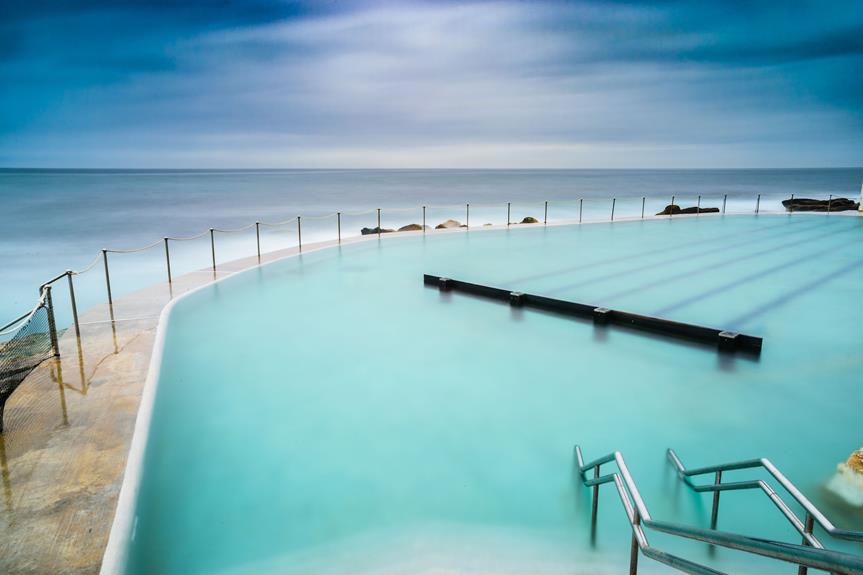Are you torn between building an indoor or outdoor pool? Did you know that indoor pools offer year-round usability, temperature control, and privacy? However, they come with a higher price tag and require proper ventilation and humidity control. On the other hand, outdoor pools provide natural lighting, lower construction costs, and no need for ventilation, but they are limited to seasonal use and require regular cleaning. In this article, we will explore the pros and cons of each option, helping you make an informed decision.
Key Takeaways
- Indoor pools offer year-round usability and temperature control, while outdoor pools are limited by seasonal limitations.
- Indoor pools provide privacy and reduced maintenance, but require proper ventilation and humidity control.
- Outdoor pools have natural lighting and fewer size restrictions, but require regular cleaning and landscaping.
- The main differences between indoor and outdoor pools include cost, maintenance, privacy, usability, and aesthetics.
The Cost Factor: Comparing Indoor and Outdoor Pools
When comparing indoor and outdoor pools, you should consider the cost factor, as indoor pools tend to be more expensive due to the enclosing structures, specialized ventilation systems, and temperature control mechanisms required. The construction cost comparison between indoor and outdoor pools is significant. Indoor pools require additional construction and equipment, such as enclosing structures to provide privacy and temperature control. These structures can include walls, roofs, and windows, which can substantially increase the overall cost. Moreover, specialized ventilation systems are necessary to maintain proper air quality and humidity levels within the enclosed space. This requires the installation of exhaust fans, air exchange systems, dehumidifiers, and air circulation methods. All of these components add to the financial implications of indoor pools. On the other hand, outdoor pools generally have lower construction costs as they do not require enclosing structures or elaborate ventilation systems. However, it is important to note that ongoing maintenance requirements, such as regular cleaning and landscaping, should not be overlooked for outdoor pools. Considering the long-term costs, both initial construction and ongoing maintenance should be taken into account when deciding between indoor and outdoor pools.
Transitioning into the subsequent section about 'maintenance comparison: indoor vs. outdoor pools', it is important to consider the impact of maintenance costs on the overall financial picture.
Maintenance Comparison: Indoor Vs. Outdoor Pools
Consider the ongoing cleaning and landscaping requirements of outdoor pools before making a decision on maintenance. When comparing the maintenance of indoor and outdoor pools, there are some key factors to consider. Firstly, let's look at the cost comparison. Outdoor pools generally have lower construction costs compared to indoor pools. However, outdoor pools require regular cleaning due to exposure to the elements, such as leaves and debris. This means that ongoing cleaning expenses should be factored into the overall cost of maintaining an outdoor pool.
In terms of cleaning requirements, outdoor pools require more attention compared to indoor pools. Outdoor pools need to be regularly cleaned to remove dirt, leaves, and other debris that can accumulate in the water. Additionally, the pool area surrounding an outdoor pool needs to be landscaped and maintained to ensure a clean and inviting environment. This includes tasks such as mowing the lawn, trimming bushes, and removing weeds. These additional cleaning and landscaping requirements can increase the maintenance workload and costs for outdoor pools.
Now that we have discussed the maintenance comparison between indoor and outdoor pools, let's explore the next section on climate considerations: the pros and cons of indoor and outdoor pools.
Climate Considerations: Pros and Cons of Indoor and Outdoor Pools
If you're deciding between an indoor or outdoor pool, it's important to consider the climate and how it will impact your pool experience. Here are some factors to consider when it comes to climate and pool options:
- Heating options: In colder climates, an indoor pool may be more desirable as it allows for temperature control throughout the year. Indoor pools can be heated using various methods such as gas, electric, or solar heating systems. Outdoor pools, on the other hand, may require additional heating options like heat pumps or solar blankets to maintain a comfortable swimming temperature.
- Environmental impact: Indoor pools tend to have a higher environmental impact due to the energy required to heat and maintain them. The enclosed space and temperature control mechanisms contribute to higher energy consumption. Outdoor pools, on the other hand, rely on natural elements like sunlight for heating, reducing their environmental impact.
Considering the climate and its impact on your pool experience is crucial when deciding between indoor and outdoor pools. The heating options available and the environmental impact of each choice can greatly affect your comfort and the overall sustainability of your pool. Now, let's explore the next section about the year-round usability of indoor and outdoor pools.
Year-Round Usability: Evaluating Indoor and Outdoor Pool Options
To determine the year-round usability of your pool, assess the availability of temperature control and the impact of weather conditions. When comparing indoor and outdoor pools, cost and maintenance are important factors to consider.
Indoor pools offer the advantage of year-round usability, thanks to temperature control mechanisms. You can enjoy swimming regardless of the weather outside. However, this convenience comes at a higher cost. Indoor pools require enclosing structures, specialized ventilation systems, and temperature control mechanisms, which increase the overall construction expenses.
Maintenance is also a key consideration. Indoor pools are easier to maintain compared to outdoor pools. With proper ventilation and humidity control, you can keep the pool area clean and prevent moisture-related issues. Stabilized chlorine is not necessary for indoor pools, unlike outdoor pools that require regular cleaning and the added effort of landscaping.
Outdoor pools, on the other hand, are typically less expensive to construct. They offer the advantage of natural lighting and no need for ventilation systems. However, they are subject to weather conditions and seasonal limitations. Regular cleaning and maintenance are necessary to keep the pool in good condition.
When deciding between an indoor and outdoor pool, evaluate your budget and associated costs. Consider the long-term expenses of maintenance and construction. Also, take into account your personal preferences, location, and climate. Ultimately, the choice between indoor and outdoor pools depends on your specific needs and desired usage.
Lifestyle and Aesthetic Considerations: Choosing Between Indoor and Outdoor Pools
When deciding between an indoor and outdoor pool, think about your lifestyle and the overall aesthetic you want for your space. Here are some factors to consider:
- Pool design: The design of your pool can greatly impact the ambiance of your space. Indoor pools often have a sleek and modern design, with clean lines and minimalist features. Outdoor pools, on the other hand, can be more natural and blend into the surrounding environment.
- Privacy: If privacy is important to you, an indoor pool may be the better choice. With an indoor pool, you have the ability to swim and relax without worrying about prying eyes. Outdoor pools, while offering the option to enjoy the outdoors, may lack the same level of privacy.
- Ambiance: The ambiance of your pool area can greatly enhance your overall experience. Indoor pools can be designed to create a tranquil and spa-like atmosphere, with controlled lighting and sound. Outdoor pools, on the other hand, can provide a more open and expansive feel, with the beauty of nature as the backdrop.
Consider these factors when deciding between an indoor and outdoor pool. Ultimately, it depends on your personal preferences and the lifestyle you envision for your space. Whether you choose an indoor or outdoor pool, both can provide a wonderful oasis for relaxation and enjoyment.
Frequently Asked Questions
What Are Some Common Misconceptions About the Cost Difference Between Indoor and Outdoor Pools?
When it comes to the cost difference between indoor and outdoor pools, there are some misconceptions that need to be addressed. One common misconception is that indoor pools are always more expensive to build than outdoor pools. While it's true that indoor pools require additional construction and equipment, outdoor pools can also come with their own set of expenses, such as regular cleaning and landscaping. It's important to evaluate the budget and long-term costs of both options before making a decision.
Are There Any Specific Maintenance Tasks That Are Unique to Indoor Pools?
Maintenance tasks for indoor pools include proper ventilation for air quality and moisture control, which requires exhaust fans, air exchange systems, dehumidifiers, and air circulation methods. Additionally, indoor pools do not require stabilized chlorine for sanitation like outdoor pools do. The benefits of indoor pools include year-round usability, temperature control, privacy, and reduced maintenance. However, these benefits come with an increased cost due to enclosing structures, specialized ventilation systems, and temperature control mechanisms.
How Does the Climate of the Area Affect the Decision Between an Indoor or Outdoor Pool?
The climate of your area plays a significant role in your decision between an indoor or outdoor pool. The climate impact determines the seasonal use of the pool. In regions with colder climates, an indoor pool allows year-round usability, maintaining a comfortable temperature regardless of the weather outside. Outdoor pools, on the other hand, are more suitable for areas with milder climates, where they can be enjoyed during the warmer months. Consider your climate when deciding between the two options.
Can an Outdoor Pool Be Used Year-Round in a Colder Climate?
In colder climates, using an outdoor pool year-round can be a challenge. The harsh winter conditions and freezing temperatures make it difficult to keep the pool water at a comfortable temperature. However, with the right precautions and equipment, it is possible to extend the pool season. Pool heaters, insulated covers, and proper maintenance can help maintain a suitable swimming environment even in colder climates. It's important to consider climate factors and invest in the necessary resources for year-round usage.
What Are Some Lifestyle Factors to Consider When Choosing Between an Indoor and Outdoor Pool?
When choosing between an indoor and outdoor pool, there are several lifestyle considerations to keep in mind. Factors such as privacy, usability, and aesthetics play a significant role in your decision-making process. It's important to evaluate your personal preferences, budget, and intended usage of the pool. Additionally, be aware of any cost misconceptions, as indoor pools tend to be more expensive due to enclosing structures and specialized ventilation systems. Consider these lifestyle factors carefully to make the best choice for your needs.
Conclusion
In conclusion, when deciding between an indoor or outdoor pool, it's important to consider your budget, maintenance needs, climate, and lifestyle preferences. While indoor pools provide year-round usability and privacy, they come with a higher price tag and require ventilation and humidity control. On the other hand, outdoor pools offer natural lighting and lower construction costs, but are limited to seasonal use and require regular cleaning. Ultimately, the choice depends on your individual needs and aesthetic preferences.



